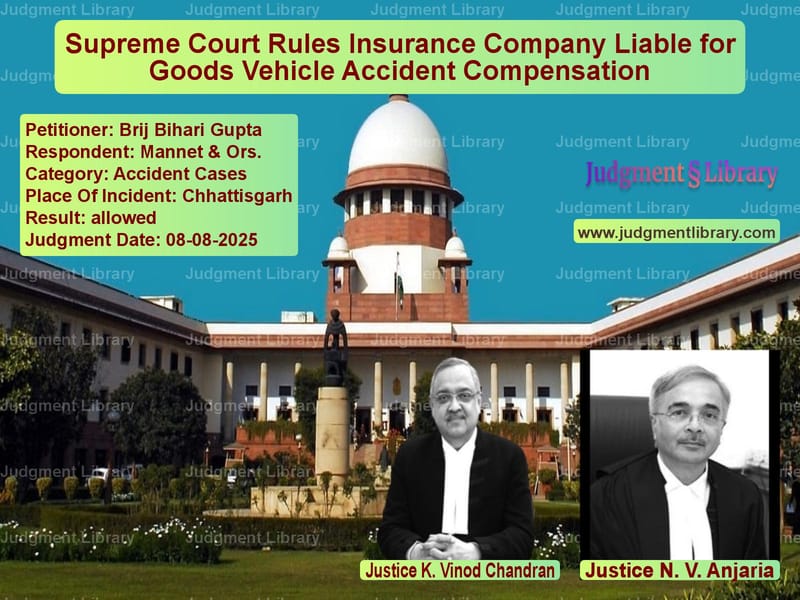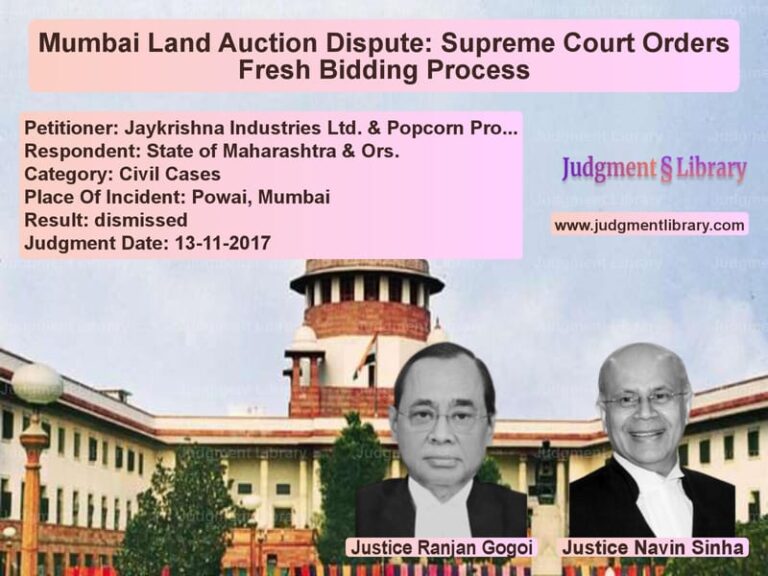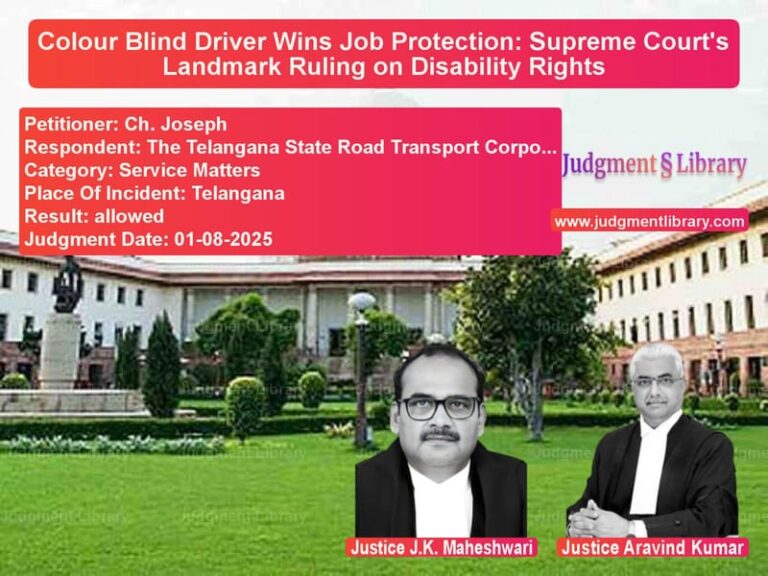Supreme Court Rules Insurance Company Liable for Goods Vehicle Accident Compensation
In a significant ruling that brings relief to accident victims and clarifies insurance liability, the Supreme Court of India has delivered a judgment that underscores the importance of protecting the rights of those injured in motor vehicle accidents. The case involved a complex legal battle between accident victims, a vehicle owner, and an insurance company that sought to avoid paying compensation by raising technical objections. The court’s decision reinforces the principle that insurance companies cannot escape their fundamental responsibility to compensate accident victims through legal technicalities.
The legal dispute began with a motor vehicle accident involving a goods carrier in Chhattisgarh. There were multiple claims filed by injured persons and families of deceased victims before the Motor Accidents Claims Tribunal. The Tribunal awarded compensation to all claimants and held both the vehicle owner and the insurance company jointly liable to pay. However, the insurance company appealed to the High Court, challenging its liability in three of the eleven claim cases. The High Court accepted the insurance company’s arguments and absolved them of all liability, placing the entire burden on the vehicle owner. This led to the current appeals before the Supreme Court.
The Insurance Company’s Arguments
The insurance company raised two primary arguments to avoid liability. First, they claimed that the injured persons and deceased victims were “gratuitous passengers” in a goods vehicle, meaning they were traveling without paying fare and without any connection to the goods being transported. Under insurance law, gratuitous passengers in goods vehicles are typically not covered by third-party insurance policies. Second, the insurance company argued that the vehicle had been transferred to the appellant through an agreement, and since the new “owner” had not taken out a separate insurance policy, the company was not liable to cover the accident.
The insurance company’s counsel, Sh. Rajesh Kumar Gupta, resisted the claim pointing out that on both the grounds urged, the insurer has no liability. The company maintained that their policy was in the name of the original registered owner, and since the vehicle had been transferred to the appellant, they had no contractual obligation to cover the accident.
The Appellant’s Counter-Arguments
The appellant, represented by Sh. Kaustubh Shukla, challenged both of the insurance company’s contentions. Regarding the status of the passengers, the counsel argued that the issue as to the passengers being gratuitous has to be considered in the context of the village setting where the goods vehicle was plying. The injured /deceased were petty hawkers who had been transporting their goods in the goods vehicle and their presence in the vehicle was in their capacity of the owner of the goods.
The appellant also challenged the insurance company’s selective approach to litigation, pointing out that there were eleven claim petitions in which awards were passed, and the insurer employed a pick and choose method to challenge only three awards. This selective challenging of awards suggested that the insurance company was inconsistent in its legal position.
The appellant also relied on the Supreme Court’s earlier decision in Naveen Kumar vs. Vijay Kumar & Ors. to support his claim for indemnification by the insurer, determining the liability on the registered owner.
The Supreme Court’s Analysis of Passenger Status
The Supreme Court carefully examined the evidence regarding whether the passengers were indeed “gratuitous” or whether they were owners of goods traveling with their merchandise. The court noted that the deposition of the claimant injured clearly indicates that he was a fish monger and the basket with fish for sale, was being carried in the goods vehicle, in which the claimant was also accompanying the goods. Likewise in C.A. No.6340/2024, the deceased passenger was a vegetable hawker, who too accompanied the goods carried in the vehicle.
The court found significant flaws in the insurance company’s evidence, noting that in the examination-in-chief of the witness for the insurer produced as Annexure-R/13, the Administrative Officer asserted that the passengers were gratuitous. But, in cross-examination he categorically stated that he did not have any knowledge regarding the status of the deceased / injured in the accident and he does not have any information as to whether they were accompanying the goods in the vehicle or not.
The court made a crucial observation about the insurance company’s failure to produce evidence: The suggestion made to the claimant hence has to be ignored. It is pertinent that in the reply to the claim filed, produced as Annexure-R/11, the insurer had raised a contention that if there were goods in the vehicle then the seizure of such goods would have been recorded in the mahazar prepared in the criminal case. However, the insurance company did not take any effort to produce any such mahazar.
The court strongly criticized the High Court’s approach, stating that The High Court has interfered with the said finding of fact without any material and in a perfunctory manner. We hence find that the contention raised by the insurer that the deceased/injured in the accident were gratuitous passengers in the vehicle remains in the realm of mere assertion without substantiation.
Ownership Transfer Issue
The second major issue concerned whether the vehicle had been legally transferred to the appellant, which would have affected insurance coverage. The court examined the agreement between the original owner and the appellant and found that the agreement only indicates that the sale consideration was fixed at Rs.90,000/- and on payment of Rs.80,000/- there was a transfer of possession. The recital in the agreement clearly indicates that the balance of Rs.10,000/- shall be paid within two months and only after the balance is paid the registration of the vehicle would be transferred. The recitals clearly indicate that there has been no transfer of ownership of the vehicle and the appellant merely had possession of the same.
The court emphasized the legal requirements for transfer of vehicle ownership under the Motor Vehicles Act: The transfer of the registration as per Section 50 of the Motor Vehicle Act, 1988 requires the transferee to report the fact of transfer in the prescribed form to the Registering Authority within whose jurisdiction the transfer is affected within 14 days of the transfer. There is no contention raised by the registered owner that he made such a report as required under Section 50(1)(a)(i) of the Act. Hence the ownership was with the registered owner even at the time of the accident and it is his liability to compensate the victims in the accident, which also has to be indemnified by the insurer.
The court relied on its earlier precedent, noting that in Naveen Kumar, the definition of owner in the Act of 1988 was interpreted to facilitate fulfilment of the object of the law, which was not to burden the claimant to follow the trail of successive transfers. The liability to pay falls squarely on the registered owner, even if there has been successive transfers which has to be indemnified by the insurer.
Court’s Final Ruling and Directions
After thorough examination of both legal and factual issues, the Supreme Court allowed the appeals and restored the insurance company’s liability. The court found that the insurance company had failed to prove either of its two main contentions – that the passengers were gratuitous or that the vehicle ownership had been legally transferred.
The court also noted the insurance company’s inconsistent approach to the multiple claims, observing that the contention raised of eight claim petitions having not been challenged has not been repelled by the insurer. The High Court has failed to consider the same and it was for the insurer to have refuted the same with documentary proof in the present appeals.
In its final order, the court directed that Awards impugned in the appeals, other than that dismissed shall be satisfied by the insurer. The court also specified that the Tribunal had granted 12% interest from the date of the claim petition and for the enhanced amount, the High Court has granted 6% interest, again from the date of filing of the claim petition.
Broader Implications of the Judgment
This judgment has significant implications for motor accident claims across India. It reinforces the principle that insurance companies cannot avoid their liability through technical objections without substantial evidence. The court’s approach demonstrates its commitment to ensuring that accident victims receive compensation without getting entangled in legal technicalities.
The judgment also clarifies the legal position regarding passengers in goods vehicles, recognizing the practical reality in rural India where small business owners often travel with their goods. By rejecting the insurance company’s argument that these passengers were “gratuitous,” the court acknowledged the economic realities of small-scale vendors and hawkers who need to accompany their merchandise.
Furthermore, the court’s strict interpretation of vehicle ownership transfer requirements provides clarity about when insurance companies remain liable after vehicle transactions. The ruling emphasizes that mere possession agreements without formal registration changes do not absolve insurance companies of their responsibility.
This decision serves as an important reminder that the primary purpose of mandatory third-party insurance is to protect accident victims, and insurance companies must fulfill this social obligation rather than seeking escape routes through technical legal arguments. The Supreme Court’s ruling ensures that the rights of accident victims remain protected and that insurance companies honor their fundamental responsibility to society.
Petitioner Name: Brij Bihari Gupta.Respondent Name: Mannet & Ors..Judgment By: Justice K. Vinod Chandran, Justice N. V. Anjaria.Place Of Incident: Chhattisgarh.Judgment Date: 08-08-2025.Result: allowed.
Don’t miss out on the full details! Download the complete judgment in PDF format below and gain valuable insights instantly!
Download Judgment: brij-bihari-gupta-vs-mannet-&-ors.-supreme-court-of-india-judgment-dated-08-08-2025.pdf
Directly Download Judgment: Directly download this Judgment
See all petitions in Road Accident Cases
See all petitions in Compensation Disputes
See all petitions in Motor Vehicle Act
See all petitions in Negligence Claims
See all petitions in Third-Party Insurance
See all petitions in Insurance Settlements
See all petitions in Judgment by K. Vinod Chandran
See all petitions in Judgment by N.V. Anjaria
See all petitions in allowed
See all petitions in supreme court of India judgments August 2025
See all petitions in 2025 judgments
See all posts in Accident Cases Category
See all allowed petitions in Accident Cases Category
See all Dismissed petitions in Accident Cases Category
See all partially allowed petitions in Accident Cases Category







